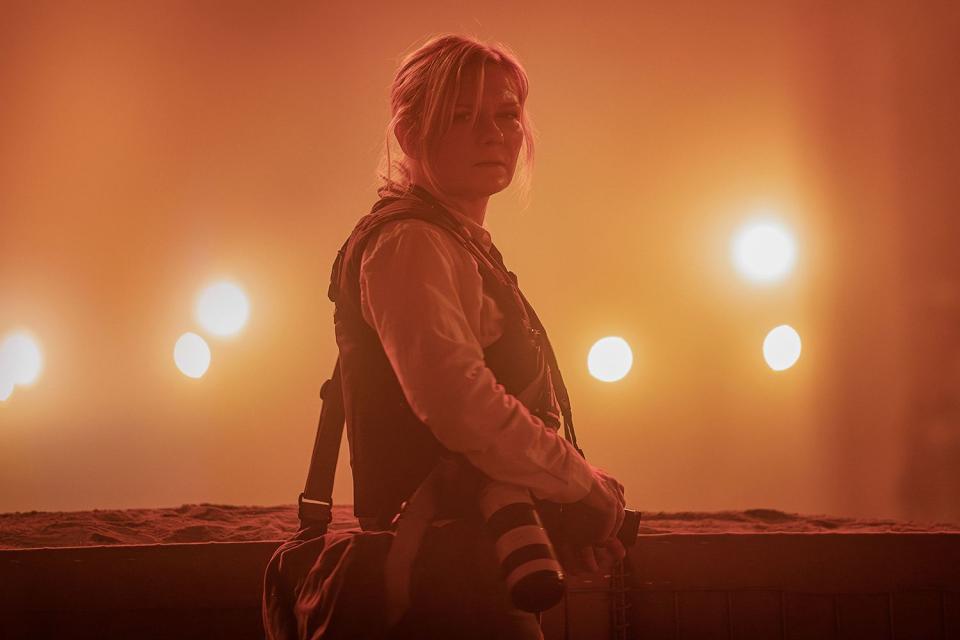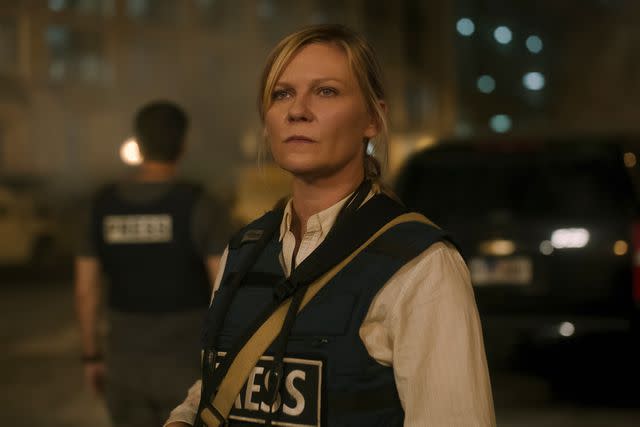“Civil War” Review: Kirsten Dunst Plays a Photojournalist Pushed to the Brink in a Searing Vision of a Nation Divided
Director Alex Garland's war film also stars 'Priscilla' actress Cailee Spaeny

A24
Civil WarAt the beginning of writer-director Alex Garland’s powerful political nightmare — it’s about a new Civil War, only this time the nation is split more East vs. West than North vs. South — the President of the United States is running lines for a speech. He plans to assure the American people that their government is winning the battle against the secessionist league fronted by California and Texas. Nothing less than a decisive military victory is imminent!
However, Mr. President is played by Parks and Recreation’s Nick Offerman, who gives off the unformed, undependable babyishness of Mr. Stay Puft. Things could be worse, of course — remember Jack Nicholson’s newscaster-glib Commander-in-Chief in Mars Attacks!? — but you doubt the public will be singing “Happy Days Are Here Again,” either.
It’s the secessionists, in fact, who seem to be prevailing. Their forces are encroaching on the Capitol, where the President has been lying low for more than a year. Lee (Kirsten Dunst), a star photojournalist working for Reuters, decides that she’ll make her way down from New York City to Washington, D.C., and somehow nab an interview — it will be the scoop of all time.
She won't be taking the southbound Acela. The country is in a state of anarchy. Quiet communities lead without any apparent reason into towns and fields torn up by bombs, guns and tanks. (And in those quiet communities, snipers are placed strategically above the shopping plazas.) It’s a giant jigsaw puzzle pieced together by thick, bloodied fingers.
You’re not even sure which soldiers belong to which army.
Director Garland, who’s shown an incredibly rich gift for creating quietly threatening atmospheres in films like the horror masterpiece Annihilation, keeps you off-kilter, and he does it with great skill. Lee and her colleagues (including Priscilla's Cailee Spaeny and Narcos’ Wagner Moura) ultimately are swept into Washington — into the White House itself — as part of a military siege driven ahead with blunt, decisive force. So, yes, someone does win here. But we have no sense of how the peace is to be concluded or of the tactics of the opponents. You don't leave the film agreeing with the old adage that war is policy continued by other means. It's hellish, meaningless chaos, depicted here in a series of transfixing, unsettling set pieces, including a surreal shoot-out in an abandoned Winter Wonderland.

A24
Civil WarCivil War belongs more to the tradition of battle movies like The Thin Red Line or Apocalypse Now, in which war is the mysterious, ineluctable manifestation of the American will — perhaps its unconscious will. If Garland had directed Saving Private Ryan, no one would have ever gotten around to accounting for all those Ryans.
Meanwhile, the people caught up in this war are also elusive. Dunst’s Lee is trying to maintain her professional neutrality while documenting suffering — until in one extraordinary moment she freezes and turns away, huddling against a wall in despair. What triggers that breakdown, though? And what allows her to regroup and go on? As an actress Dunst is a bit like her director — not at all soft or ill-defined, yet somehow oblique.
That's not a criticism — her restraint is part of her honesty and her power in everything from Melancholia to The Power of the Dog. Good acting isn't emotional carpet bombing.
In theaters April 12, R.
For more People news, make sure to sign up for our newsletter!
Read the original article on People.


